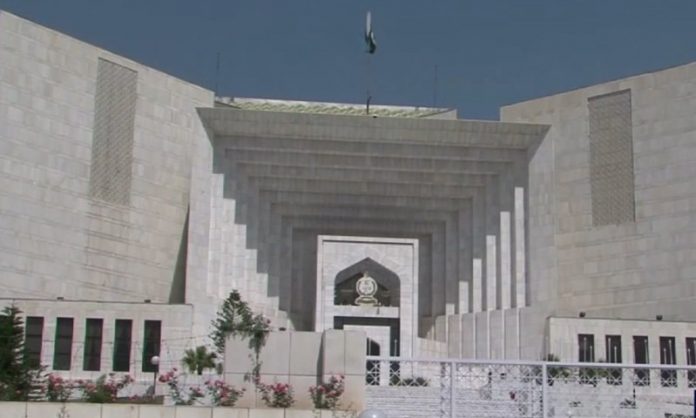ISLAMABAD: The Supreme Court of Pakistan on Thursday giving a split verdict on Panama case ordered to form a joint investigation team (JIT) within seven days to investigate how money was transferred to Qatar by the Sharif family. The JIT would complete its probe within 60 days.
The five-member larger bench remarked that formation of JIT had been ordered as the DG NAB had failed to investigate the matter.
The JIT will comprise of seven members from SECP, MI, ISI and NAB.
Justice Asif Khosa and Justice Gulzar concluded that Prime Minister Nawaz Sharif should be disqualified. However, the bench remarked that prime minister had not been disqualified
The judgement authored by Justice Ejaz Afzal Khan, which was read out by Justice Asif Saeed Khosa.
The detailed judgment of the Supreme Court began with a popular quote “Behind every great fortune there is a crime” from novel ‘The Godfather’. The novel was written by Mario Puzo in 1969.
Earlier in the day, a ring of steel was placed around the court ahead of the ruling on corruption allegations against the prime minister and his family members.
Around 1,500 police commandoes and riot forces have been deployed around the court in Islamabad ahead of the highly-anticipated decision.
Dozens of baton-wielding police were also seen along some roads leading into the capital.
The controversy threatened to plunge Nawaz Sharif´s governing party into turmoil ahead of looming general elections, and as security and the economy improve in the militancy-plagued country.
It erupted with the publication of the so-called Panama Papers last year, 11.5 million secret documents from Panamanian law firm Mossack Fonseca which documented the offshore dealings of many of the world´s rich and powerful.
Among the global elite implicated were three of Sharif´s four children — his daughter and presumptive political heir Maryam, and his sons Hasan and Hussein.
At the heart of the matter is the legitimacy of the funds used by the Sharif family to purchase several high-end London properties via offshore companies.
Sharif´s ruling PML-N party insists the wealth was acquired legally through family businesses in Pakistan and the Gulf.
But lawyers for Pakistani cricketer-turned-politician Imran Khan, leader of the Pakistan Tehreek-i-Insaf (PTI) party, argue the paper trail for the funds is non-existent, and say the onus is on Sharif to prove his relatives did not engage in money laundering.
The case has dominated headlines in Pakistan for the better part of a year, though many observers believe the court would be reluctant to directly oust Sharif.
It has repeatedly emphasised it is not conducting a criminal trial, while PML-N lawmakers told AFP that Sharif himself had not been named in the Panama Papers.
“We are hopeful the decision will come according to the law of the country, not on expectations of the opposition,” provincial PML-N lawmaker Hina Butt said.
The court has taken such action before, however, holding former prime minister Yousuf Raza Gilani in contempt in 2012 for refusing to re-open corruption investigations into then president Asif Ali Zardari, resulting in his disqualification.
– ´Change the course of history´ –
But the five-member bench could also direct law enforcement agencies to carry out more detailed investigations into the allegations against Sharif, verbally censure him or his children, or clear him entirely.
“The nation is expecting some sort of judgement which will change the course of history in Pakistan,” senior Supreme Court lawyer S.M. Zafar told AFP, though he said it was difficult to predict the verdict.
Regardless of the outcome, he said, the case was important for Pakistan, which ranked a lowly 116th out of 176 countries in a corruption index released by Transparency International in January.
Political analyst Rasul Buksh Rais said: “It´s going to be (a) historic decision that will push Pakistan into electoral mood in either case,” adding that he did not expect disqualification.
He said a new judicial commission could be in the offing, which would allow Khan to claim moral victory for exposing corruption.
“Whether the court convicts him or not today it spells trouble and the prime minister will be weakened,” added Herald newspaper editor Badar Alam.
PML-N and PTI lawmakers reaffirmed to AFP late Wednesday that they would accept the court´s decision.
The controversy is the latest to hit Sharif, an industrialist serving his third term as prime minister after the first two were interrupted by interventions from the country´s powerful military.
Late Wednesday he detailed his party´s infrastructure achievements in televised comments at the inauguration of a power plant, without mentioning the looming verdict.
If Sharif is ousted, the PML-N can select a new prime minister from within the party, though there may be political pressure for fresh polls.
Pakistan, which marks its 70th anniversary of independence later this year, has seen a surge in optimism in recent months.
Security has dramatically improved in the last two years, overall confidence in the economy is growing, and the military, which has ruled the country for more than half its history, appears to have reached an accommodation with Sharif´s civilian government.





